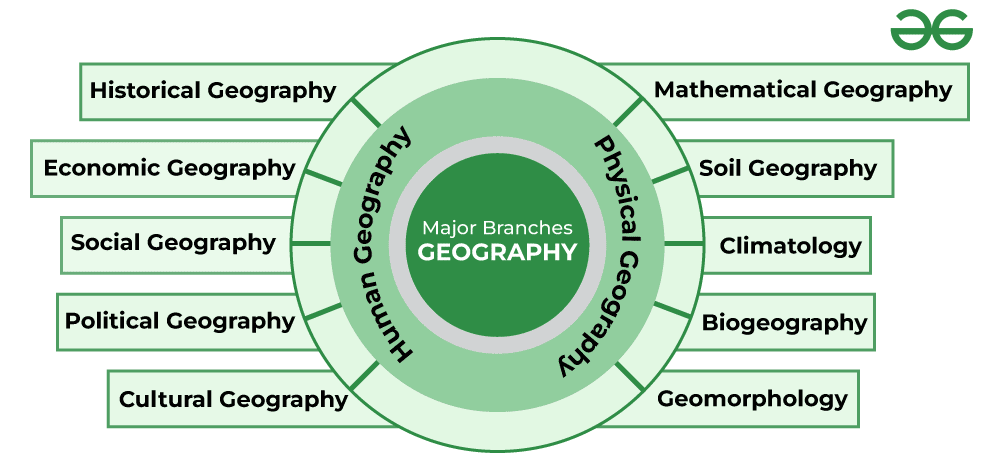What are the major disciplines of Geography?
Last Updated :
14 Jun, 2023
Geography has two essential branches, physical and human geography, and various sub-disciplines, which incorporate both physical and human components. A geographer may be a human geographer who works in culture and further has some expertise in religion. That equivalent geographer could likewise direct side examination on ecological issues.
One advantage of topography is that its broadness offers a wide exhibit of peculiarities to investigate. Everything happens someplace, and accordingly, everything is topographical. Human geography, as well, comprises various sub-strains that frequently cross over and interface.

Major Disciplines of Geography
The principal sub-disciplines of human geology include social topography the investigation of the spatial element of culture), financial geology (the investigation of the conveyance and spatial association of monetary frameworks), clinical geology (the investigation of the spatial appropriation of wellbeing and medication, political geology the investigation of the spatial component of the political cycle, populace topography otherwise called, the investigation of the qualities of human populaces, and metropolitan topography the investigation of metropolitan frameworks and scenes. Human geographers basically investigate what people cooperate with and mean for the earth. the principal sub-disciplines are biogeography the investigation of the spatial dissemination of plants and creatures, climatology the investigation of the environment, hydrology the investigation of water, and geomorphology the investigation of Earth’s geographical highlights. This rundown isn’t comprehensive, be that as it may. A few geographers concentrate on geodesy, logical estimation, and the portrayal of Earth. Others concentrate on pedology, the investigation of soils.
Physical Geography
Physical geography consists of many diverse elements. These include The study of the world’s interaction with the sun, seasons, the creation of the environment, barometrical tension and wind, storms and climatic unsettling influences, ecological zones, microclimates, the hydrologic cycle, soils, waterways and streams, verdure, enduring, disintegration, regular dangers, deserts, glacial masses and ice sheets, waterfront territory, environments, geologic frameworks, thus substantially more.
Human Geography
Human geography deals with analyzing, describing, and reflecting upon the geographical organization and development of human populations in their ecological and group environments. It hence separates itself from demography which, as the numerical study of the human populace, centres around the cycles of ripeness, mortality, and relocation and how these make unsurprising populaces. Put another way, populace geology underlines how populaces and populace processes show up and change across space, while demography stresses change over the long run. This article investigates the disciplinary premise of information, surveys three significant ways to deal with information creation, and closes with a brief list of qualifications for exceptional discussions. It contends that while spatial science approaches have loaned believability and essentialness to scholarly discussions inside and past the field, and underlying methodologies have offered significant experiences about disparities, further incorporation of these with arising social methodologies is expected to handle contemporary information challenges.
Here are some examples of disciplines in human geography.
- Economic geography: It is the study of the monetary aspects and ways in which living is earned.
- Cultural geography: It is the study of human settlements in their places.
- Historical geography: It is the study part of geography that concentrates on the manners by which geographic peculiarities have changed after some time.
- Social geography: It is the study part of human geography that is keen on the connections between society and space.
- Political Geography: It is the study part of geography that arrangements with the limits, divisions, and assets of states.
- Rural geography: It is the study of peculiarities that are ordinary in the provincial space.
Environmental Geography
Environmental geography is the study of the relationships between humans and the environment. It looks at the ways in which humans modify the environment and how these changes affect the environment. It also looks at the impacts of environmental degradation and pollution, and how these can be addressed. This discipline is closely linked to physical and human geography and is often used to understand the long-term effects of environmental changes.
Regional Geography
Regional geography is the study of the environment and human activities within a specific region or area. It looks at the physical, cultural, and economic characteristics of a region and how they interact with one another. It is often used to understand the dynamics of a region and to develop strategies for sustainable development.
Geographical Information Science
Geographical Information Science (GIS) is a rapidly growing field of geography that uses computer-based technology to map, analyze, and interpret geographic data. GIS combines many different disciplines, such as physical and human geography, to create powerful and sophisticated models of the world. GIS is used for a variety of applications, such as urban planning, disaster management, and environmental monitoring.
Related Links
- Physical features of India
- Human Environment
Frequently Asked Questions
Q 1. What are the six disciplines in Geography?
Answer-
Six disciplines in Geography would include:
- Spatial terms
- Places and regions
- Physical systems
- Human systems
- Environment and Society
- Uses of Geography
Q 2. What are the two major disciplines of geography?
Answer-
The two major disciplines of geography include physical geography and human geography.
Q 3. What is geography as a discipline of study?
Answer-
Geography as discipline of study includes places and the relationships between the people and their immediate environment.
Like Article
Suggest improvement
Share your thoughts in the comments
Please Login to comment...